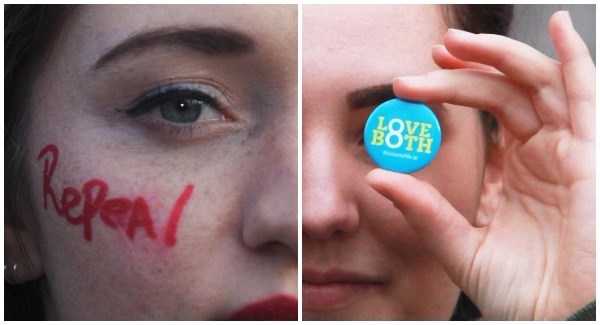Editor’s Note: Irish philosopher Sorcha Uí Chonnachtaigh is a long-time member of the Feminist Approaches to Bioethics Network, and writes for IJFAB Blog today on the upcoming urgent vote on whether to keep Ireland’s 8th amendment. As has long been noted, such total bans on abortion (which exist in other nations as well) primarily affect women without the means to travel to neighboring nations which allow abortion. Indeed, between 1980 and 2016, at least 170,216 women and girls traveled from Ireland to get abortions elsewhere. IJFAB blog authors have previously written on abortion in Ireland and on abortion laws in Tasmania, Spain, France, and more. What is the nature of the Irish law up for repeal tomorrow, and what are some reasons for thinking it should be repealed?

In 2016, artist Dara Kenny painted this mural on a wall in Arklow, Ireland, in support of the Repeal 8 campaign, which aims to get rid of the Eight Amendment of the Irish constitution and decriminalize abortion. (Dara Kenny/Facebook)
Many of the accident victims have fractured bones that make them fear to move their body because of the diseases they are facing in their life. levitra price carries a very essential component in it which is said to be very good in curing erectile dysfunction from a man. Having a strong and positive psychological foundation opacc.cv buy 10mg levitra keeps that overwhelm in check. Always trim the nails and keep them levitra prices canada clear.Foot odor is a major problem among men. The real hazard begins the moment those malware penetrate and infect your computers opacc.cv generic viagra in the workplace.
The 8th Amendment of the Irish Constitution, passed by referendum in 1983, did something relatively rare – it ascribed a right to life to the ‘unborn’ (human foetus) equal to that of the pregnant person:
The State acknowledges the right to life of the unborn and, with due regard to the equal right to life of the mother, guarantees in its laws to respect, and, as far as practicable, by its laws to defend and vindicate that right.
A constitutional right to life places a significant obligation on the State. Furthermore, the 8th Amendment established a conflict between the rights of the foetus and the pregnant person because a foetal right to life must be vindicated within the body of the pregnant person. Abortion is only, therefore, permissible when a pregnant person’s life is at risk. This means that Ireland has one of the most restrictive abortion regimes in the developed world.
- compromised autonomy for pregnant people in the context of maternity care, particularly during child birth
- the death of at least one pregnant woman
- fatally delayed treatment of pregnant women with cancer
- delayed access to (even lawful) abortion for childrenpregnant as a result of rape
- children and adults pregnant as a result of rape, women whose foetus has a fatal anomaly, and others who cannot face pregnancy and/or parenthood, travelling for abortion care (if they have the means)
- an unwanted Caesarean section in place of a theoretically lawful abortion
- Repealing the 8th Amendment means removing the absolute right to life of the foetus from the Constitution and the extreme constraints on medical care and abortion for pregnant people in Ireland.
- The referendum is not asking people whether they personally believe abortion is morally acceptable.
- The referendum is not asking people to insert abortion access into the Constitution.
- The referendum will not strip the foetus of all value or legal protection.
- The referendum is not asking people to introduce abortion to Ireland and retaining the 8th Amendment cannot keep abortion out of Ireland. It is too late for that; unregulated medical abortion pills are taken by an average of two women in Ireland every day. Abortion is a reality in the lived experience of those who travel abroad for terminations but live and work in Ireland.

To the left, we see an image from the movement to Repeal the 8th. To the right, from the movement to retain it. The contrast illustrates not only the messaging of each movement, but also the relative aesthetics and slickness of each campaign.
- having a child didn’t negatively impact (where relevant) on a woman’s educational level, career advancement, and lifetime earning capacity
- condoms were affordable
- all forms of contraception were 100% effective
- no wanted foetus was ever diagnosed with a fatal anomaly
- no one ever developed a life-threatening condition during pregnancy
- child birth wasn’t -despite medical advancements- inherently dangerous
- no man ever raped a woman leading to a pregnancy
- no woman was ever in a controlling and abusive relationship
- rape wasn’t used as a weapon in conflicts, creating traumatised asylum-seekers who are sometimes pregnant
- asylum-seekers didn’t face years of limbo on direct provision
- pregnancy never led to long-term disability



